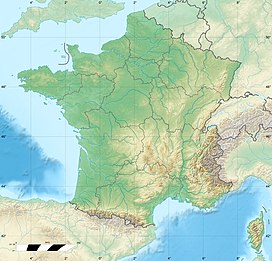Aiguille du Chardonnet
| Aiguille du Chardonnet | |
|---|---|
 View from Argentière (west side) | |
| Highest point | |
| Elevation | 3,824 m (12,546 ft) |
| Prominence | 503 m (1,650 ft)[1] |
| Listing | Alpine mountains above 3000 m |
| Coordinates | 45°58′08″N 07°00′05″E / 45.96889°N 7.00139°E |
| Geography | |
| Parent range | Mont Blanc Massif |
The Aiguille du Chardonnet (3,824 m) is a mountain in the Mont Blanc massif in Haute-Savoie, France. It lies between the Glacier du Tour and the Argentière Glacier. The border with Switzerland (elevation: 3,680 m at its nearest point) runs just east of the summit. The East or Forbes Arete provides a popular and classic mountaineering route to the summit.
The summit was first climbed on 20 September 1865, by a party comprising R Fowler, M Balmat and M Ducroz. The first winter ascent was made some time prior to 1914.[2]
Routes
- West Ridge – traditionally regarded as the 'normal' and easiest route on the mountain, it is nowadays most commonly used as a means of descent. On the French adjectival climbing scale, is graded at AD−. First ascent P Thomas, J Imboden and J Lochmatter, 1 August 1879.[2]
- East Ridge (Forbes Arete) – a classic alpine mountaineering route described as "one of the finest expeditions of its class anywhere in the Alps", and is combined with a descent of the west ridge. First ascent by L, H and T Aubert and M Crettez on 30 July 1899. Grade AD.[2]
There are many other mountaineering routes on the Chardonnet. On the northern side these include the North Buttress (D−); North Couloir (TD−); North West Couloir (TD−). On the south west face, Capucins Buttress Direct offers along and sustained climbing on rock at D+.[2]
Access
The Aiguille du Chardonnet is most easily reached from the Albert Premier Hut, though the Trient Hut and Saleina Hut also give access.[2]
References
External links




